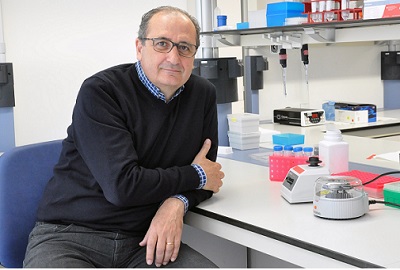An international study in which the Universitat de València has participated has identified the most affected bacteria of the human body by diseases and drugs. The research, published in the journal ‘FEMS Microbiology Reviews’ in which participates the full university professor of Genetics Andrés Moya, suggests that one bacteria can counteract the negative effect of several diseases by different mechanisms and molecules.

An international study coordinated by the Universitat de València, Foundation for the Promotion of Health and Biomedical Research of Valencia Region (FISABIO), the Spanish National Scientific Research Council (CSIC) and the Universidad CEU San Pablo, has discovered that 10 out of 5,000 bacterial genres that form the human microbiota are very influenced by factors such as diseases and drugs. Given that some of the 10 genres have a beneficial effect on health, the results of the study, published in the journal FEMS Microbiology Reviews, could help in the creation of new therapies for the prevention of problems associated with bacterial deficits.
Likewise, the results of the research reflects for the first time that one bacteria can behave in a different way when the organism goes through a different distresses. “The study also suggests the possibility that one bacteria can help to counteract the negative effect of several diseases by different mechanisms and molecules in each case”, has emphasised Andrés Moya, full university professor of Genetics of the Universitat de València, researcher in the recent Institute of Integrative and Systems Biology (I2SYSBIO, UV-CSIC) and in FISABIO.
The human body is inhabited by at least 5,000 genres of micro-organisms that reside in the skin, mucosa, respiratory tract, vagina and digestive tract. These micro-organisms forms the microbiota, which presents some peculiarities and characteristics that can be modified by multiple factors. The scale and consequences of these alterations depend on the nature, strength and duration of the perturbations. “Not all the micro-organisms of our body are equally resistant or stable”, states Manuel Ferrer, researcher of CSIC in the Institute of Catalysis and Petrochemistry.
“Based on previous studies, we have carried out a comparative analysis of 105 diseases, 68 antibiotic treatments and other 22 types of factors. Among others, we have selected: age, diet, drugs, sexual relations, tobacco, treatments with pre- and probiotics, climate or geographic location. The results indicates changes in 250 genres out of 5,000 that resides in our body and 10 of them are very influenced by at least 50% of the studied factors”, says Rafaela Bargiela, researcher of CSIC in the Institute of Catalysis and Petrochemistry.
The 10 bacteria more susceptible to alterations are the ones related to the genres Lactobacillus, Clostridium, Blautia, Faecalibacterium, Streptococcus and Enterococcus (filo Firmicutes), Bacteroides and Prevotella (filo Bacteroidetes), Bifidobacterium (filo Actinobacteria) and Escherichia (filo Proteobacteria). “The studied factors in this research lead to modifications in the amount of these micro-organisms. Knowing this information is essential because many of these bacteria have a beneficial effect in our health”, adds Manuel Ferrer.
Treatments
The identification of the micro-organisms, that are beneficial for a proper functioning of the human body and sensitive to environmental changes, could help “in the design of new probiotic food enriched with some of these bacteria, diets or therapies that could improve their development”, concludes Ferrer.
“The strategy goes through a combination of different technologies -omics and computational- that allow us to identify clearly, from the differential analysis of the functions in cases control facing pathology, those bacteria or groups of them, which are in charge of the differences”, concludes Andrés Moya.
Medical University of Bialystok (Poland) and the scientific Celia Méndez García, from Carl R. Woese Institute for Genomic Biology (EEUU) have also collaborates with this study.
Article:
D. Rojo, C. Méndez-García, B. A. Raczkowska, R. Bargiela, A. Moya, M. Ferrer i C. Barbas. «Exploring the human microbiome from multiple perspectives: factors altering its composition and function». FEMS Microbiology Reviews. DOI: 10.1093/femsre/fuw046

.jpg)







